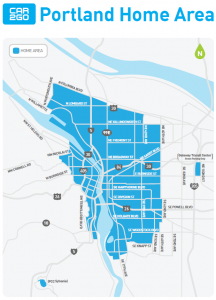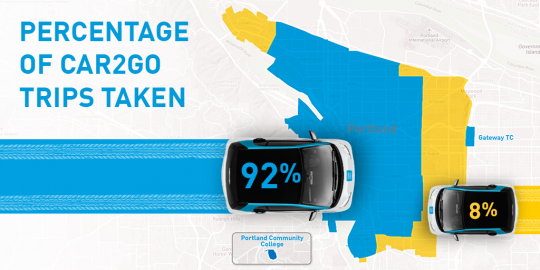Soon after introducing bike racks to half its fleet, the floating-fleet car-sharing service car2go has made a much less popular change: it’s slicing its Portland service area by about a third.
The company said that areas east of 60th Avenue and northwest of Portsmouth, including Montavilla, Cully, Lents and St. Johns, had accounted for only 8 percent of trips and that 90 percent of car2go users surveyed said they were unsatisfied with vehicle availability. The company says that eliminating the least-used parts of the service area will lead to more car density in the remaining areas.
But that didn’t prevent digital howls Friday from disappointed users of the service — some of whom compared the problem to the one that’ll be faced by any future bikesharing system in Portland, too.
@car2go @car2goPortland Epic fail on cutting services in the Portland area. You take our fees and then take away the service, Stay Classy!
— Joshua Hackney (@joshuaxhunter) July 31, 2015
Shame on @car2go . This is basically a map defining equity issues in Portland. http://t.co/tnabkjKKWd
— Cora Potter (@bungalowranch) July 31, 2015
.@car2goPortland Cutting the mid-eastside? Really really disappointed. Your service is basically useless to me now.
— Nick Christensen (@NickCPDX) July 31, 2015
It's too bad @car2goPortland is doing this. scaling back availability and jacking up costs isn't going to fix the biz model.
— Andrea Damewood (@adamewood) July 31, 2015
If C2G wants to cut service for profits, i get it. but then maybe the city doesn't need to give such a sweetheart deal on downtown parking.
— Aaron Brown (@ambrown) July 31, 2015
@briandavispdx That’s exactly the point: these systems are under public purview. If they exacerbate inequality, then no deal. #car2gone
— Justin Carinci (@JustinCarinci) July 31, 2015
Scumbag @car2goPortland: Has amazing service, cuts off service to blue-collar family neighborhoods that need it most.
— Brandon Rhodes (@BrandonDRhodes) July 31, 2015
@car2goPortland Understandable. And understandably frustrating when a beloved company chooses to deepen inequality in an deeply divided city
— Brandon Rhodes (@BrandonDRhodes) July 31, 2015
also, this doesn't just hurt epdx *residents.* many of my car2go trips are to epdx to support businesses/nonprofits out that way
— Aaron Brown (@ambrown) July 31, 2015
@evanlandman a better idea would have been to recruit in east pdx and st johns rather than cut those areas. then increase cars.
— dillonm.exe (@dillonm) July 31, 2015
A handful of people defended the decision, or at least argued that the public couldn’t control it:
The problem with car sharing (and bike sharing if we get it) is that optimizing these systems will by definition be inequitable.
— Brian Davis (@briandavispdx) July 31, 2015
…and saying "equity" doesn't make it less true. Service isn't provided in many wealthy areas either (West Hills, Eastmoreland).
— Iain (@maccoinnich) July 31, 2015
But the bikeshare analogy is also a sign of conflicts to come:
I want bikeshare here, but I hope this is thought through carefully w/r/t what the public/private partnership that runs it looks like.
— Brian Davis (@briandavispdx) July 31, 2015
Advertisement
It’s worth noting that the car2go area has changed many times since the service’s 2012 launch. When it began, its north boundary was Killingsworth Street and its east boundary was 82nd Avenue, so much of North, Northeast and East Portland were excluded from the start. But the ongoing expansion of car2go’s service area had instilled confidence in many Portlanders that the service’s boundaries were getting larger, not smaller — an evolution that maybe seemed to make up for the fact that its prices had risen from 35 to 41 cents per minute.
The change comes two months after the service began adding a flat $1 fee on every trip, significantly driving up the cost of short trips but lowering the service’s insurance deductible, and a few weeks after it ended its service in Eugene.
Last December, we reported that Portland was the car2go capital of North America when it came to vehicles per square mile. Car2go didn’t respond to a question on Twitter about the size of its Portland fleet going forward.
It’s not clear how the arrival of ridesourcing services Uber and Lyft in Portland this summer has or will affect demand for car2go. Like car2go, Uber has said it is likely to add bike racks to many of its vehicles in an effort to facilitate multimodal trips.
As the City of Portland keeps trying to move toward the launch of a privately operated public bikeshare system — and as the startup Spinlister prepares to launch the country’s first fully private bike-sharing system in Portland — the talk about how much control the public can expect or demand over its shared transportation services is only going to continue.




